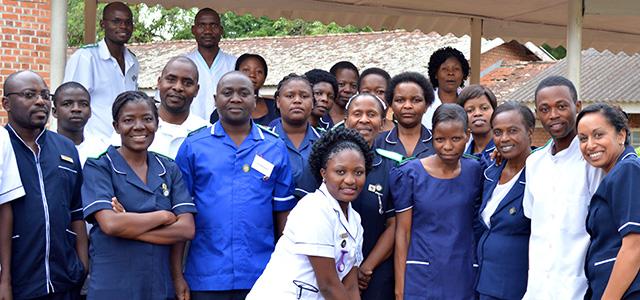
Melanie Perera (far right) with nurse educators from colleges all over Malawi following a clinical teaching training planned in collaboration with Kamuzu College of Nursing and GAIA
Empowering Women, Fostering Health in Malawi
When UC San Francisco School of Nursing’s Sally Rankin first visited Malawi in 2000, the HIV/AIDS epidemic was tearing through sub-Saharan Africa. As she moved around the country with her husband’s nascent nonprofit organization – the Global AIDS Interfaith Alliance, or GAIA – people with the disease were hiding in back rooms, fearful of being seen in public. Children who weren’t infected were becoming orphans at astonishing rates.
In 2001, Ellen Schell (BS ’86, MS ’89, PhD ’94) was working as a project director at the School on two grants having to do with older adults, but the accounts pouring out of Africa recalled her time as a medical-surgical nurse treating a young AIDS patient in San Francisco during the early days of the epidemic. When Rankin told Schell GAIA was looking for someone to become its first employee, Schell jumped at the opportunity. Today, she is international programs director for GAIA.
After spending the first five years of her career as a pediatric nurse at Lucile Packard Children’s Hospital, Melanie Perera volunteered for a British nongovernmental organization (NGO) and, in 2008, wound up training nurses in one of Malawi’s most isolated rural areas. She loved the work, but when she found herself assuming some of the roles and responsibilities of an advanced practice nurse in the US, Perera decided to credential herself, enrolling in the School’s pediatric nurse practitioner (PNP) program.
There she met Rankin, who by then was associate dean for Global Health and International Programs and, in collaboration with GAIA, had begun administering a United States Agency for International Development (USAID) grant to strengthen nursing education in Malawi. When Perera finished her NP program in 2012, Rankin offered her the job of overseeing the grant in-country. “I had gone back to school to be an NP, but having an opportunity to impact the nursing at a national level across Malawi was too exciting to pass up,” says Perera.
The intertwined careers of these three women and the powerful draw of GAIA’s mission exemplify the 13-year relationship between the School and GAIA. Through formal and informal partnerships, the two organizations have not only made an enormous contribution to improving the lives and health of many in Malawi, but also serve as a model for a new generation of global health partnerships at the School.
Training Community Caregivers
Back in 2001, however, in their efforts to better understand Africa’s AIDS crisis, Schell and Rankin were struck by the fact that 60 percent of those infected with the virus were women. “It was clear that helping to empower women would be part of the solution,” says Schell.
After multiple trips to Malawi, Schell, Rankin and Rankin’s husband, Bill, arrived at the idea of the GAIA Villages program: training village women as community caregivers, which would entail such duties as conducting HIV and health education workshops, providing at-home care for villagers, helping people get testing and treatment, and advocating for those suffering from the disease. In addition to a stipend, the women would receive training that could help them become economically self-sufficient.
GAIA received seed funding from the Bill & Melinda Gates Foundation and, says Schell, expert consulting from School faculty, including, over time, multiple research projects that have helped inform GAIA’s work in Malawi. In the years since, the Villages program has implemented sustainable community caregiving projects in 180 villages in Southern Malawi, with a staff that today is composed entirely of Malawians.
“We feel very strongly that the best development projects work from the ground up and employ local people,” says Schell.
“We bring some technical expertise, but GAIA Malawi is run by Malawians, and that is really what our collaboration should be – working in partnership, learning from each other,” says Perera.
The Scholarships
The Villages program established GAIA’s reputation in Malawi, and in 2004, Schell and Rankin found themselves speaking with the dean of the University of Malawi Kamuzu College of Nursing about the school’s struggles to fill available nursing slots for its bachelor’s degree program.
The problem was that many qualified students could not afford the tuition and living expenses, which are roughly the equivalent of $2,000 per year. This was a particularly disturbing problem in a country that, according to GAIA’s website, has only 37 nurses for every 100,000 people. Given the AIDS crisis, Malawi desperately needed to grow its nursing workforce.
“Bill [Rankin] is a masterful fundraiser and engaged the Gruber Family Foundation, while we worked with our staff in Malawi to design a program in which we pay for tuition, uniforms and nursing supplies – and a living stipend,” says Schell.
The nurses, in turn, commit to working in the Malawi Ministry of Health’s state-run hospitals for five years. The commitment helps avert the common problem of skilled nurses moving to Western countries or into the private sector in Malawi, where the pay is greater and the workload less onerous. GAIA-funded nurses have an especially exemplary record of staying on to fulfill their commitment.
In 2010, USAID became interested in the program after seeing GAIA’s successes. The agency worked out a cooperative agreement whereby GAIA would conduct fundraising to match what would ultimately become a five-year, $2.9 million grant from USAID.
That’s the point where the School got officially involved, with Rankin assuming administrative duties for the USAID subcontract to UCSF and successfully encouraging fellow faculty members to come to Malawi to help train nursing students there in maternal and child health. The trainings in emergency triage assessment and treatment, basic emergency obstetrical and neonatal care and the administration of antiretroviral therapy (ART) to HIV-infected patients help improve the quality of nursing care throughout the country.
“Malawi is one of the only countries where people can get initiated on antiretroviral therapy by a nurse,” says Perera. “And the emergency triage and treatment training provides nurses with the skills to provide emergency care in the first 24 hours of a patient’s arrival to the clinic or hospital, which is often a time when many children in Malawi die due to lack of prompt treatment.”
Continued Success
The third major GAIA program is a mobile health clinic program, begun in 2008, with funding from the Elizabeth Taylor AIDS Foundation. With much of Malawi’s population living in remote rural villages, the mobile clinics have brought basic health services, including HIV testing, considerably closer to those who need them.
While measuring the success of global health efforts is rarely easy, Perera notes GAIA has sponsored almost a quarter of recent bachelor’s degree nurses working in the public sector in Malawi today, and GAIA-sponsored nurses work in 26 of the 28 Malawian districts.
Similarly, “In our villages when we started out, it was really hospice care,” says Schell. “Now we see people get connected to treatment and get well. Now our work is to help more people get tested and connected to care if they are positive. We entered villages where only maybe 55 percent of HIV-positive people were on treatment, and when we left, 96 percent were on the treatment.
“I feel really fortunate to have found this work,” she continues. “For me, the GAIA-UCSF collaboration is global health work at its best.”



